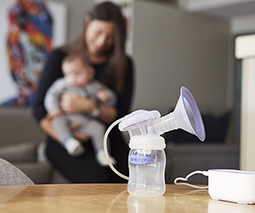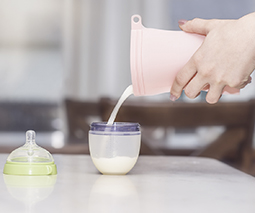Opinion: Here’s the real formula for feeding success (and it’s NOT formula!)

Midwife and mother of two, Amberley Harris has a passion – teaching new mothers to breastfeed their babies. As she says, “Stats show while 96 percent of Australian mamas initiate breastfeeding, just 39 percent are still breastfeeding at three months of age. Can you believe that?”
Blaming misinformation and lack of support for the dramatic drop in numbers, Amberley shares her own breastfeeding story as a way to show why it’s so important that new mothers get the help they need in those early days.
It was 2am and I was in my newly born son’s nursery. The golden light from the salt lamp illuminated the room as I sat down on the grey lounge chair to breastfeed him for the fourth time that night. He was fussy at the breast, likely from my engorged boobs, and while I struggled to attach him in my overwhelmingly sleep deprived state, he started to cry.

He bobbed his head around frantically, eagerly sucking his hands, while I tried to keep my composure. His cry turned to what my hubby and I affectionately referred to as “billy goat status” where he sounded like a distraught kid. I tried my best to help him to attach properly while a cascade of tears rolled along the bridge of my downward-facing nose. It was in that moment I realised how unquestionably hard breastfeeding was and I longed for a magic fix…
Enter the cheer squad
My magic fix came in the form of support. A healthy balance of both professional support including my darling midwife and lactation consultant, along with my personal cheer squad including my hubby, sister and parents.
There are many women out there however, who are lulled into believing there is a better magic fix. One they should purchase before their baby is born. This particular fix I’m referring to is infant formula, and it concerns me deeply that mums-to-be have been encouraged via a well-known blog recently, to buy this before they have even given birth.
Now I know breastfeeding is all-kinds-of-hard. I’ve been there. But having a substitute on hand does not set women up for success; what it actually does is tell them they aren’t enough. Even if women are completely committed to breastfeeding, if they don’t know all the facts, they may be far more willing to reach for the formula, thinking it’s free of consequences, on one of the many tough days in the first few weeks. Plus, well-meaning but poorly informed partners are more likely to push for formula as a way to “help”, and very quickly, a mother’s breastfeeding relationship with her baby goes from falling into place to a place of jeopardy.
Breastfeeding works on simple maths
Breastfeeding works on a very simple equation – demand = supply. The first six weeks of breastfeeding is the time it takes for the milk-making cells in the breasts to learn exactly how much milk they need to make for the baby. Any introduction of formula throughout the influential first six weeks – but anytime in fact – will negatively impact a mother’s milk production. This is because formula sits in a baby’s gut up to three times longer than breastmilk, making a baby full for longer and less likely to want to feed from the breast to both stimulate and maintain an abundant milk supply.
Read more on breastfeeding:
- I struggled to breastfeed my baby – then I found supply line feeding
- How to get the correct nipple latch when breastfeeding your baby
- Breastfeeding your baby to sleep? It doesn’t make you a bad mum
Formula use brings detrimental sequels to a baby’s immunity, gut flora and digestion, just to name a few. Furthermore, it is a sure-fire way to sabotage one’s breastfeeding journey before it’s even begun.
All the reasons to breastfeed
Newborn babies are instinctively driven to feed frequently – they are programmed this way. A big part of this is because the gastric emptying time (the time it takes for a baby’s stomach to breakdown breastmilk) is around 90 minutes. Therefore, it is not long before babies have digested their milk and are wanting to feed again. Frequent feeding patterns in breastfed babies are also a theorised protective measure against Sudden Infant Death Syndrome (SIDS), because they are less likely to drift into a deep sleep cycle (which formula fed babies can, because they don’t feel hunger as soon) but will rouse for another feed. Another important point is babies breastfeed for a plethora of reasons outside hunger. Comfort, temperature regulation, belly discomfort, wind pains, overtired, overstimulated, the list goes on … Instead of doubting a mother’s milk supply over her very regular tiny breastfeeder, let’s remember how NORMAL this newborn behaviour actually is.
Rather than encouraging mums-to-be to invest their money in the band aid solution and false economy of formula, a far better fit would be encouraging them to put it towards breastfeeding education and professional support. If women aspire to breastfeed, they should do just that, BREASTFEED. The best thing mamas can do for their baby in those early days and weeks is breastfeed them whenever they wish. Yes, it’s going to feel like a whole lotta breastfeeding, but the good news is, this type of feeding will settle down and babies do sink into a more predictable feeding pattern as they grow. Until then, let’s remind mothers to trust their baby and trust their boobs. AND trust Mother Nature, because she sure wouldn’t have based the survival of our species off having a back-up tin of powdered milk in the pantry.
This post was originally published at Maternal Instincts by Amberley.









